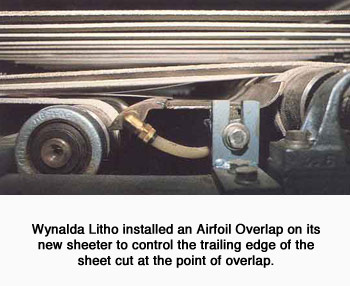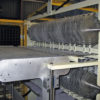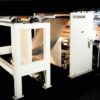With the purchase of a sheeter, one folding carton manufacturer more than doubled the production capability of its sheeting operation and reduced its labor requirements by more than 75%.
Wynalda Litho, Rockford, MI, has manufactured folding cartons for the entertainment, pharmaceutical and cosmetic industries for more than 20 years. During that time the company has developed a reputation for producing its product with rapid turnaround time, largely due to its ability to process orders entirely in-house.
 “Our average lead time on a job is five days,” said Robert Wynalda, president. “Compared to the industry average of four to 12 weeks, that is extremely fast. We wouldn’t be able to service customers this quickly if we had to rely on outside sources for parts of our operation.” The evolution of these in-house abilities and increased customer demand prompted the company to recently expand its existing capabilities by 30%. As part of this expansion program, Wynalda Litho needed to increase the efficiency of its sheeting operation.
“Our average lead time on a job is five days,” said Robert Wynalda, president. “Compared to the industry average of four to 12 weeks, that is extremely fast. We wouldn’t be able to service customers this quickly if we had to rely on outside sources for parts of our operation.” The evolution of these in-house abilities and increased customer demand prompted the company to recently expand its existing capabilities by 30%. As part of this expansion program, Wynalda Litho needed to increase the efficiency of its sheeting operation.
“Our old sheeter was much too labor-intensive,” said Wynalda. “We were running it three shifts a day, with three people on each shift. In addition, the sheets coming off the machine weren’t square and needed to be trimmed.”
Minus seven people
The company investigated a number of sheeters, finally deciding on a sheeter from Westerly, RI-based Maxson Automatic Machinery Co. that enabled it to reduce its sheeting operation to one shift a day with two operators. Now sheeted material does not need to be trimmed, and the remaining seven people are utilized on other projects.
The machine came equipped with a sheet-length monitor, an air-foil overlap system and a decurler, as well as a continuous delivery system that made possible a 25% increase in production. Operators can off-load the completed stacks of sheeted material without shutting the machine down. An extended grid system temporarily holds the sheeted material while the stacker is being off-loaded.
One expense saved for Wynalda Litho is the clean cut made by the knife system, reducing dust during operation.
“The sheeter has a two-knife system, with one stationary and one rotating knife. By properly adjusting the knives we are able to obtain a clean cut to minimize dust,” explained Wynalda.
Since sheeting of the SBS board is one of the first steps in producing the company’s printed folding cartons, its relies on its sheeting operation to ensure delivery of quality products to its customers.
“We feel the quality of the sheeted product determines the quality of the end product, so we make sure the sheeter is always running at top efficiency,” said Wynalda.
To further ensure consistent high quality of its end product, the company is in the process of instituting a statistical process control program. Since the sheeter is equipped with a sheet-length monitor, it can easily be integrated into the SPC program.
Wynalda Litho is now able to monitor the number of sheets obtained per roll, the linear footage of each roll and the sheet-length variation for each job. Including this information as part of the SPC program increases the accuracy of the program.
With its expansion program completed, Wynalda Litho is looking toward a future of continued growth. “The next phase of our growth is the complete implementation of the SPC program. The Maxson sheeter with the sheet-length monitor fits very well to this plan,” Wynalda concluded.
Reprinted from Boxboard Containers, September 1989






